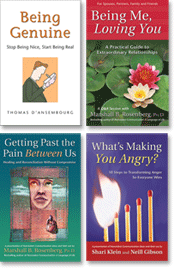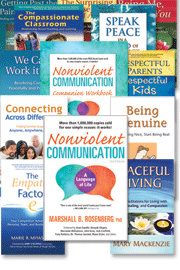Focused On the Sunny Side ... continued
...and what we do want (rather than what we don't or shouldn't want) is far more effective in creating the changes we want in others and ourselves.
If you think about it, needs–which are at the core of the NVC model, is all about shifting the criticism and blame into the positive. Rather than what's wrong, what are we wanting, on a core level? And it's also compelling to me that in NVC, we see feelings as all intrinsically "positive" and valuable, since an indicator of our needs and what's driving, motivating, or inspiring us. All of NVC in effect can be seen as focused on the glass half full, or the sunny side of the street.
NVC is sometimes called 'heart language' because our goal to connect from the heart. One important element is to connect with our heart's desire…what do we want? What do we need? And in turn we can practice guessing the same about our fellow humans–what's really driving their words and actions? What would contribute to greater happiness for everyone involved? All of this is generative, and focused on the positive.
This may sound idealized to some and in fact is' very practical. Working with managers, I often find they are frustrated about how to get the results they want. When speaking with them in more detail, I find that their directions can be in the negative (what they don't want, what's not working, what's behind schedule, etc.)
When they are positive (I want more teamwork! More co-operation.) their requests often can benefit from more concreteness and specificity. If you think about it, this is a form of stating things in the positive–being clear about what you want is the ultimate kind of positivity.
Try this on in your body: try saying out loud a judgment, demand or blame. Now state it in the positive, in terms of needs. For example, "You never listen to me!" How does that feel, on a sensation level, in your body? Now try this: "I'm really longing to be heard" How does that land in your body, in contrast?
To explore this more, here's an excerpt from Connecting across Differences along with an exercise from the book to give us some practice! Again, throughout the year I'll be including excerpts from Connecting across Differences to celebrate the release of the book in German. Thanks again to Jennifer Coleman for her help with this project!

Here's the excerpt:
A third important point when responding empathically to others is that we want to identify what the person wants, not what the person doesn't want. This is like "walking on the sunny side"—focusing on the positive and moving forward.
Just as the sun illuminates our surroundings, this contributes to greater clarity. It also increases connection and the chances that needs will get met, since we're focused on what we are wanting to experience.
Notice the difference, for example, in saying to someone, "So you don't want noise here when you're working?" or asking, "So you're really longing for quiet so you can focus?" Rather than focusing on the problem—noise—we can focus on the solution or desire: in this case, quiet.
EXERCISE 5: Sunny Side Up
For each of the following statements, what might you guess the person is feeling and needing?
A. "That was the rudest salesperson I have ever met. I can't believe they keep someone like that on staff to abuse customers!"
Feeling(s): _____________
Need(s): _________________
B. "It's hopeless. I'm never going to pass this course. It was so dumb of me to think that I could handle twenty credits in one semester and be in the band."
Feeling(s): _____________
Need(s): _________________
C. "My so-called friend is avoiding me ever since I lent him twenty dollars. I'll never trust him again. If he can't pay it back or doesn't intend to, I just wish he wouldn't lie about it."
Feeling(s): _____________
Need(s): _________________
D. "The stress is really getting to me. I am feeling so pressed—by my parents, my teachers, my job, and my girlfriend. I can't remember the last time I was able to just relax and unwind."
Feeling(s): _____________
Need(s): _________________
Take a moment and consider something that you've complained about today. What are you wanting?
State it in the positive–on a needs level, and/or as concretely and specifically as possible as a request.
How does that support you in actually meeting your needs?
Dian Killian, PhD, is a Certified Trainer with the international Center for Nonviolent Communication, a certified life coach and former faculty member with the distance learning Coaching for Transformation program, and author of two books, Urban Empathy: True Life Adventures of Compassion on the Streets of NY, and Connecting across Differences: How to Connect with Anyone, Anytime, Anywhere (now in its second edition and in German). Founder and former director of the Center for Collaborative Communication, she now offers coaching and training via WorkCollaboratively.com to diverse organizations from small and large NGOs to multinational and Fortune 100 companies. She also leads the annual East Coast Women's Retreat and regularly offers programming at Kripalu, the 92nd St. Y, Omega, the NY Open Center, the NVC Academy and in Europe.
Dian teaches regularly with the NVC Academy. She also collaborates with the following organizations: CNVC, Leadership that Works, Bridges Global.
Keep learning these vital
communication skills with these books and training
resources:
This Month's Specials:
- NVC Extraordinary Relationship Package or eBook Package - Save 60% off list price through March 31, 2015
- Reference Library Book Package or eBook Package - Save 60% off list price through March 31, 2015
- Connecting across Differences 2nd Edition Book or eBook Save 50% off list price through March 31, 2015
Every Day Book
Package Specials:
- NVC Essentials Book Package and eBook Package - Save 40%-50% on this book package every day from PuddleDancer Press
- NVC Marshall Rosenberg Book Package and eBook Package - Save 45%-55% on this book package every day from PuddleDancer Press
- Save at least 30%-55% off of retail on all other Books and Packages every day.










